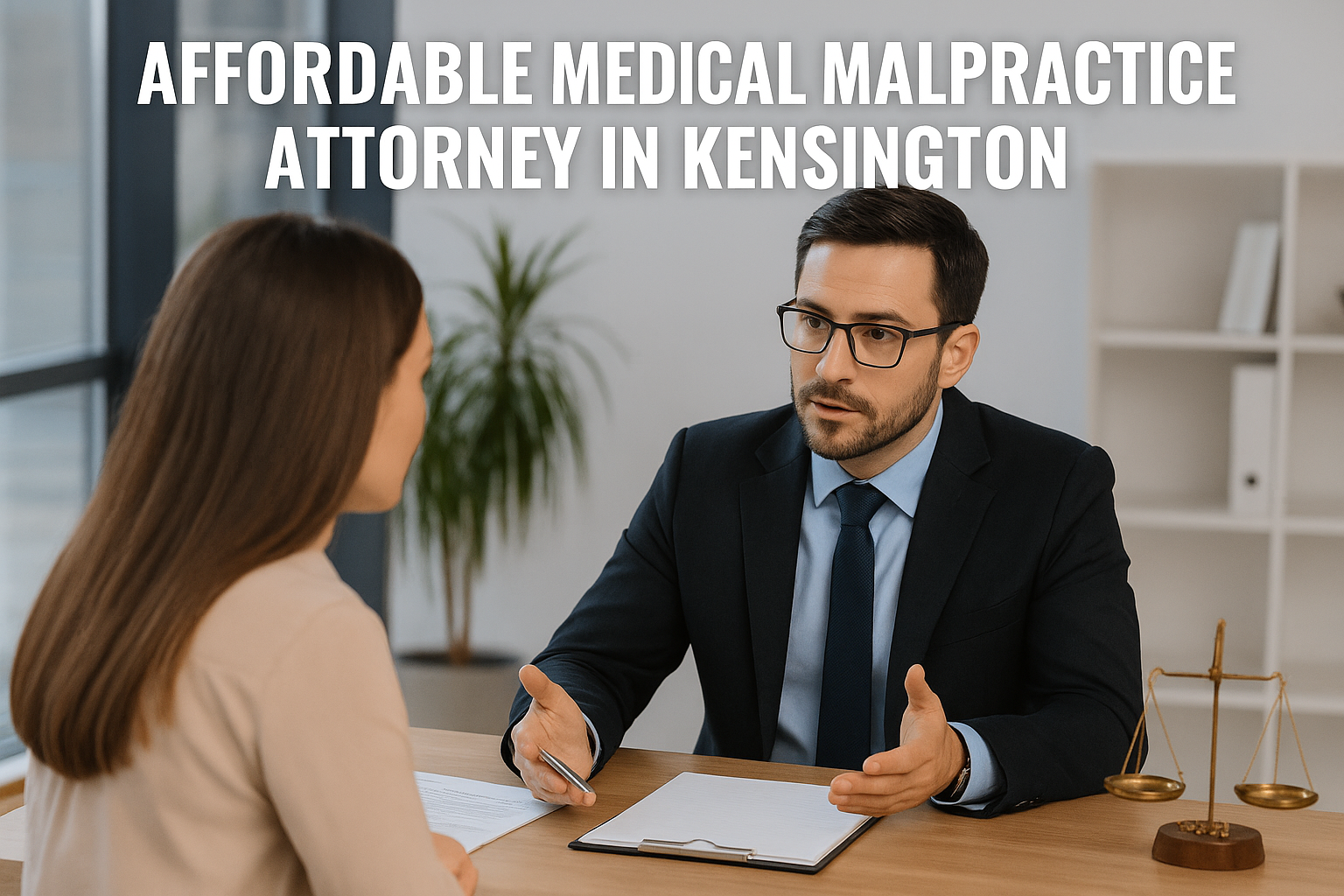When medical care harms instead of heals, the path to recovery may include legal action. If you or a loved one has experienced injury due to possible medical negligence, this guide walks you through how to find an affordable medical malpractice attorney in Kensington, what to expect in the claims process, how contingency fees work, and practical tips to strengthen your claim.
Understanding Medical Malpractice
Medical malpractice occurs when a healthcare provider deviates from accepted standards of care and that deviation causes harm. Not every poor outcome is malpractice — the key elements are a duty of care, a breach of that duty, causation, and demonstrable damages.
What typically counts as malpractice?
- Misdiagnosis or delayed diagnosis: Missing or delaying a diagnosis that leads to harm.
- Surgical mistakes: Wrong-site surgery, retained instruments, or anesthesia errors.
- Medication errors: Wrong drug or dosage resulting in injury.
- Birth injuries: Negligent care during delivery causing harm to mother or baby.
- Failure to obtain informed consent: Not explaining risks or alternatives where that failure leads to harm.
Why hire a local attorney in Kensington?
Local attorneys bring knowledge of regional court procedures, local expert witnesses, and experience with Kensington-area medical institutions. That familiarity often helps with strategic case decisions, negotiations, and efficient evidence collection.
Benefits of choosing an affordable option
“Affordable” does not mean inexperienced. Many highly skilled malpractice lawyers work on contingency, which lets clients pursue claims without upfront legal bills. Contingency align incentives: lawyers invest time when there's merit to the case, and clients pay only on recovery.
How attorneys evaluate your case
At the initial consultation, a good attorney will:
- Review medical records and timeline of events.
- Identify whether the provider deviated from standard care.
- Estimate damages: medical bills, lost earnings, pain and suffering.
- Decide whether expert testimony is required and likely available.
Fee structures explained
Typical arrangements for malpractice work include:
- Contingency fee: A percentage of the settlement or award (commonly 25–40%). No fee if you lose.
- Costs and expenses: Litigation costs (expert reports, court filings) are often advanced by the firm and repaid from recovery.
- Hybrid or limited retainer: Rarely, some firms combine a small retainer with lower contingency.
Always get fees and expense arrangements in writing and ask for an itemized explanation of how costs are handled if the case is unsuccessful.
Step-by-step: Filing a malpractice claim in Kensington
1. Free initial consultation
Bring medical records, bills, and a short timeline. The attorney will assess strengths/weaknesses and explain the options.
2. Investigation and experts
Attorneys obtain complete medical records, consult independent medical experts, and prepare a causation and damages analysis. Expert reports often determine whether a case is viable.
3. Demand and negotiation
Before filing suit, many attorneys send a formal demand to the provider's insurer seeking compensation. Skilled negotiators aim for fair settlements to avoid costly trials.
4. Litigation and trial (if necessary)
If settlement fails, the case may proceed to court. Trials involve depositions, witness testimony, expert cross-examination, and presentation of medical evidence. Trials can be lengthy but sometimes produce higher compensation.
How to choose the right affordable attorney
- Specialization: Look for attorneys who focus on medical malpractice, not generalists.
- Track record: Ask about past settlements and verdicts, particularly in cases similar to yours.
- Communication: Confirm expectations about updates and case points of contact.
- Transparency: Request a written fee agreement and example of likely costs.
Practical tips to strengthen your claim
- Collect and preserve all medical bills, prescriptions, appointment notes, and test results.
- Keep a detailed timeline of symptoms, diagnoses, and conversations with medical staff.
- Document non-financial losses — pain levels, reduced daily activity, emotional impact.
- Get second medical opinions when appropriate and preserve those records.
Frequently Asked Questions
What is the average cost of a medical malpractice attorney in Kensington?
Most malpractice attorneys use a contingency model: a share (often 25–40%) of any recovery. If you do not recover, you typically pay no attorney fees, though you may owe certain case costs depending on your agreement.
Can I afford an attorney if I have no money up front?
Yes. Contingency arrangements and free initial consultations make representation possible without upfront payments.
How long do I have to file a malpractice claim?
Statutes of limitations vary by jurisdiction. Typical windows range from 2–3 years from the date of injury or discovery. Because timelines can be complex, consult a Kensington attorney promptly to preserve rights.
What compensation might I recover?
Potential damages include past and future medical bills, lost income, reduced earning capacity, pain and suffering, and in rare cases punitive damages. The amount depends on case facts and jurisdictional caps.
Are hospitals and doctors insured?
Yes — most providers and hospitals maintain liability insurance. Claims are commonly negotiated with insurers rather than providers directly.
What should I bring to my first meeting?
Provide medical records, discharge summaries, bills, a chronology of events, names of treating providers, photos (if relevant), and notes about how the harm affected daily life.
Red flags to avoid when choosing representation
- Promises of guaranteed outcomes — no credible attorney guarantees results.
- Vague or shifting fee terms — insist on clear, written agreements.
- Lack of malpractice experience — complexity of medical law requires specialists.
Next steps: Preparing for your consultation
Make a concise timeline, gather records, list questions, and prepare a summary of damages. Ask the attorney how they will handle experts, how long the case is likely to take, and how often they will update you.
